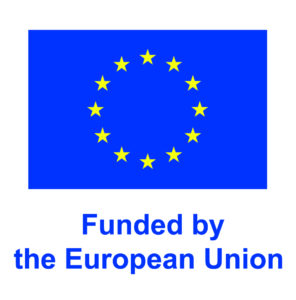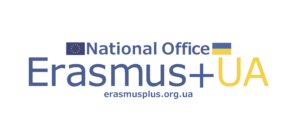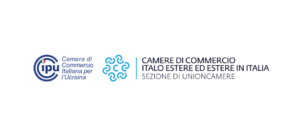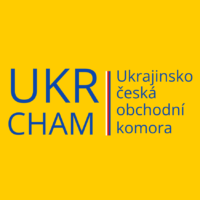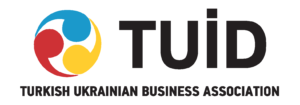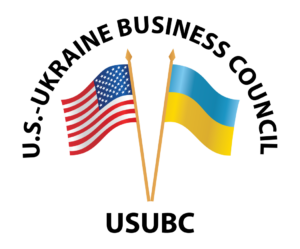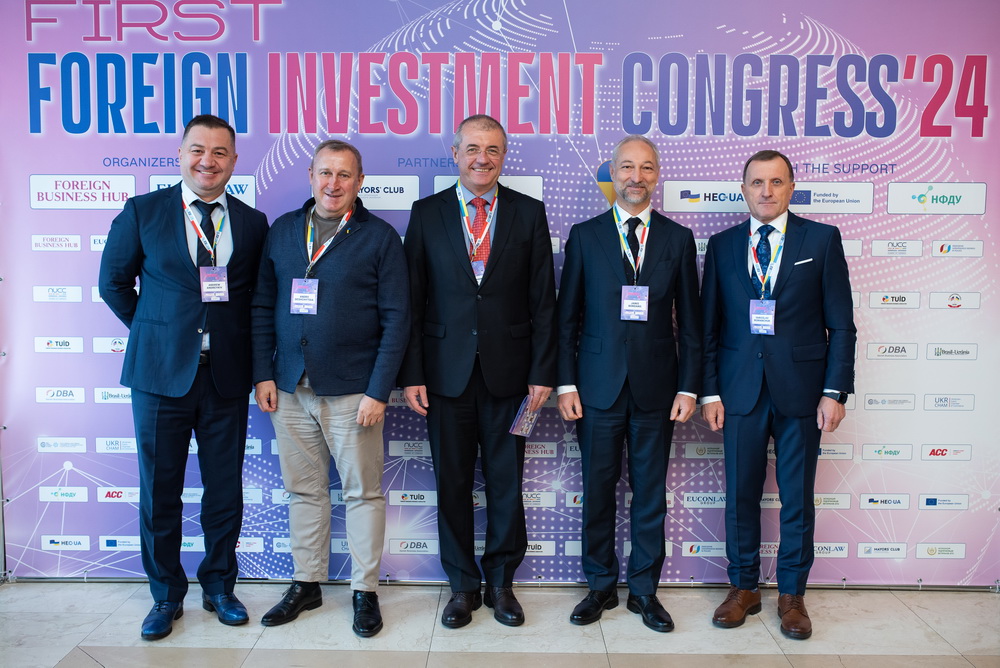
On 31 October 2024, Kyiv hosted the First Foreign Investment Congress, which became an important event for strengthening economic partnerships with foreign businesses and attracting investment to Ukraine.
The Congress brought together 110 participants from 20 countries, becoming a communication platform for dialogue and discussion of future ways of cooperation in the process of Ukraine’s recovery.
The event was attended by representatives of urban communities from 26 major cities of Ukraine, ambassadors, heads of economic departments of 14 embassies, representatives of international financial institutions, investors, 10 international business associations and government officials.
The event featured 34 speakers from 12 countries, including Ukraine, Germany, the United States, the Czech Republic, France, Brazil, India, Turkey, the United Kingdom, Poland, Latvia and Romania.
The Congress has become an important platform for attracting financial resources and foreign investment on the way to restoring Ukraine’s capacity and economic potential.
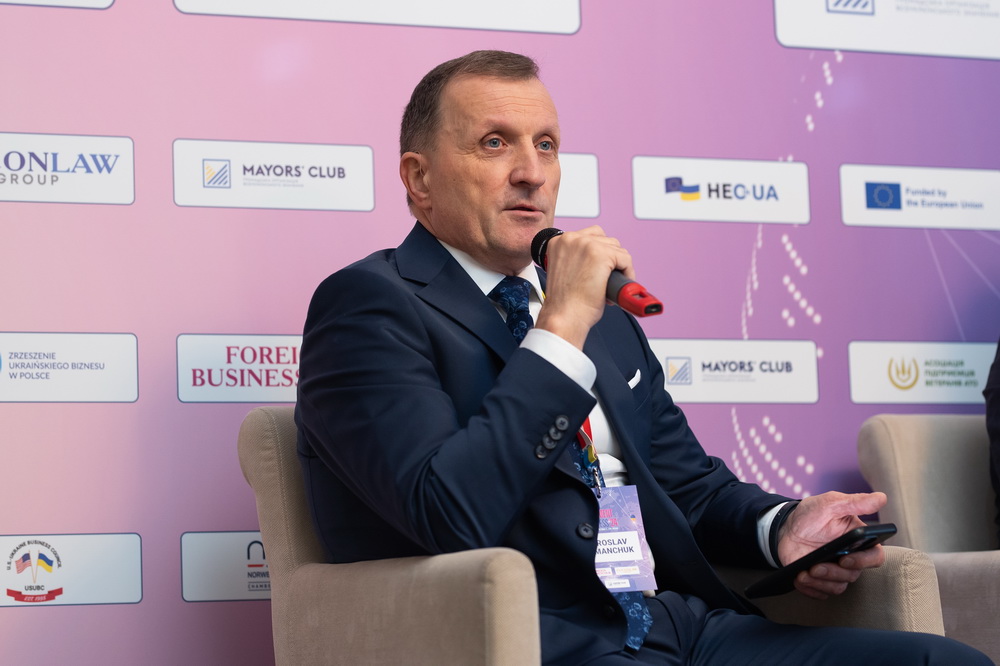
The event was opened by Yaroslav Romanchuk, Managing Partner at EUCONLAW Group, Co-Chairman of the Congress Organising Committee. In his welcoming speech, Mr Romanchuk emphasised that the key goal of the First Foreign Investment Congress is to create an international communication platform for cooperation between foreign businesses, investors, Ukrainian regional communities, international financial institutions, diplomatic missions and the government of Ukraine and other governments to support and develop Ukraine.
“We have a clear vision and plan for the development of this platform. Ukraine should stop being a country of problems and become a country of opportunities – this is our main slogan that we will promote among our international partners. Our country has great potential for attracting investment due to its favourable geographical location, extensive logistics, developed infrastructure, digital economy and high investment returns. The skilled labour force is also an important factor that makes Ukraine attractive to investors”, – said Yaroslav Romanchuk.
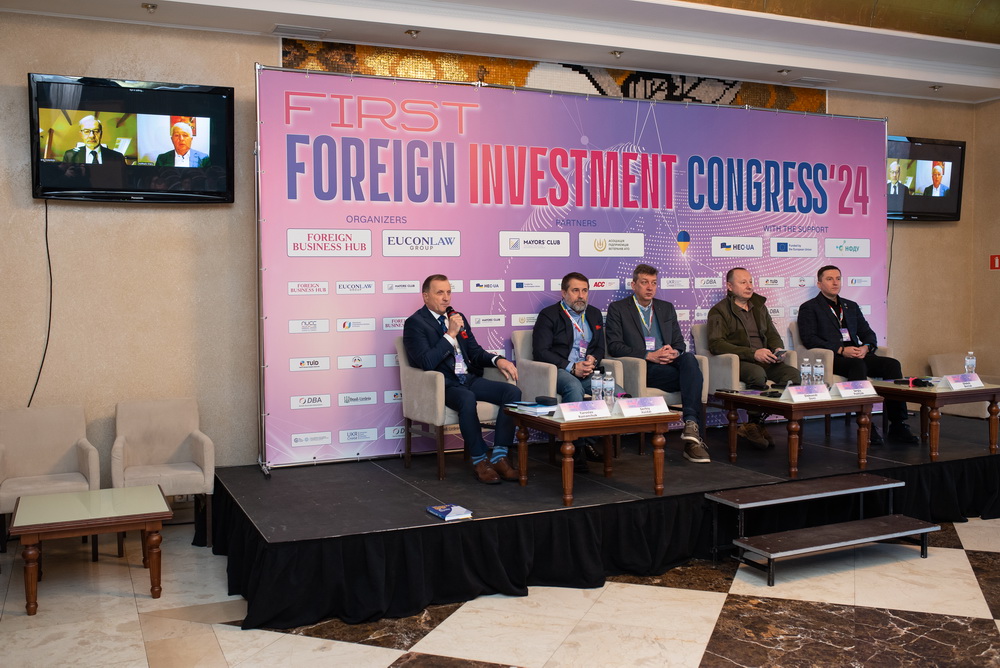
The first panel discussion was dedicated to the comprehensive transformation plan between Ukraine and the West as a reasonable hope for a favourable, lasting, and stable investment climate in Ukraine. The panel was moderated by Yaroslav Romanchuk.
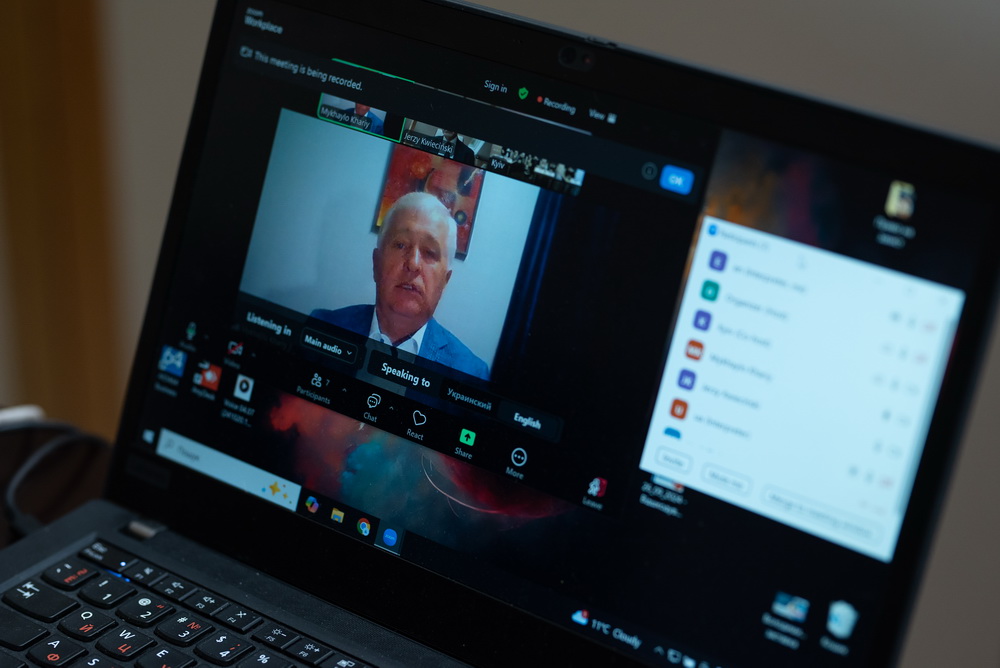
Mykhailo Khariy, Coordinator of the Civil Society Initiative ‘Transformation of Ukraine’, presented the project he is working on together with Ukrainian civil society activists and international experts with experience of successful transformations to achieve EU and NATO membership. According to him, the project has already been presented in Washington and Warsaw. It envisages the creation of a system of public administration and local self-government that will meet European standards, as well as the development of a veteran policy and a new economic model for Ukraine’s integration into the European and transatlantic space.
The project also aims to create a system for transferring knowledge and experience to all participants in the transformation process and to form an effective civil society ecosystem for the development and implementation of the change plan. ‘We have already established institutions such as the National Transformation Centre, the National Council of Soldiers and Veterans, the National Council of Volunteers, and are planning to establish the National Council of Entrepreneurs, the Council of Diplomats, and the National Council of Civil Activists. We have also initiated an inter-parliamentary project called ‘Transformation of Ukraine’ in the Ukrainian parliament and the Polish Sejm, and after the elections we plan to expand the initiative and launch it in the US Congress and the European Parliament,’ said Khariy.
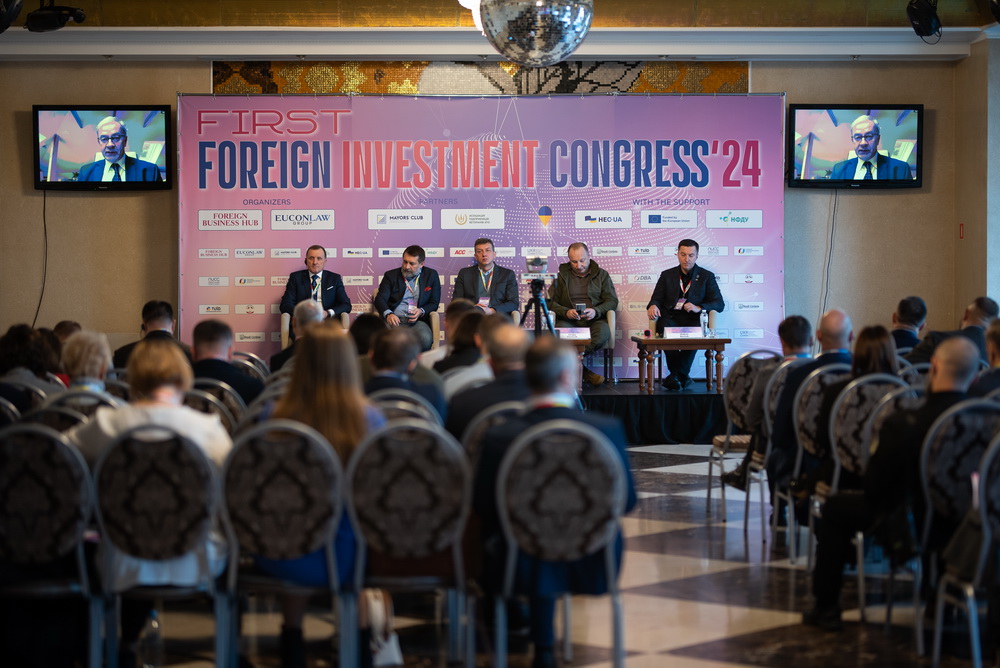
Jerzy Kwieciński, Transformation Expert, former Minister of Investment and Economic Development of Poland (2018-2019), noted that he is a part of the team working on Ukraine’s transformation. During his presentation, he stressed the importance of strategic planning and the role of civil society in the process of integration into the EU and NATO. He reminded that Poland, on its way to EU membership, received significant funding in the form of grants, about 200 million euros, and private foreign investment, which contributed to the country’s economic development. “When I worked in the government, my goal was not only to use European funds effectively, but also to create conditions for attracting private investment and preparing the country for EU accession”, – the speaker underlined.
According to the expert, despite the difficult situation with the war, Ukraine now has a unique opportunity to join the Euro-Atlantic community, but the transformation process requires time, active participation of civil society and a clear strategy.”The initiative launched by Mykhailo Khariy is an example of important work that has the support of international partners and contributes to Ukraine’s preparation for accession to the EU and NATO”, – added Kwieciński.
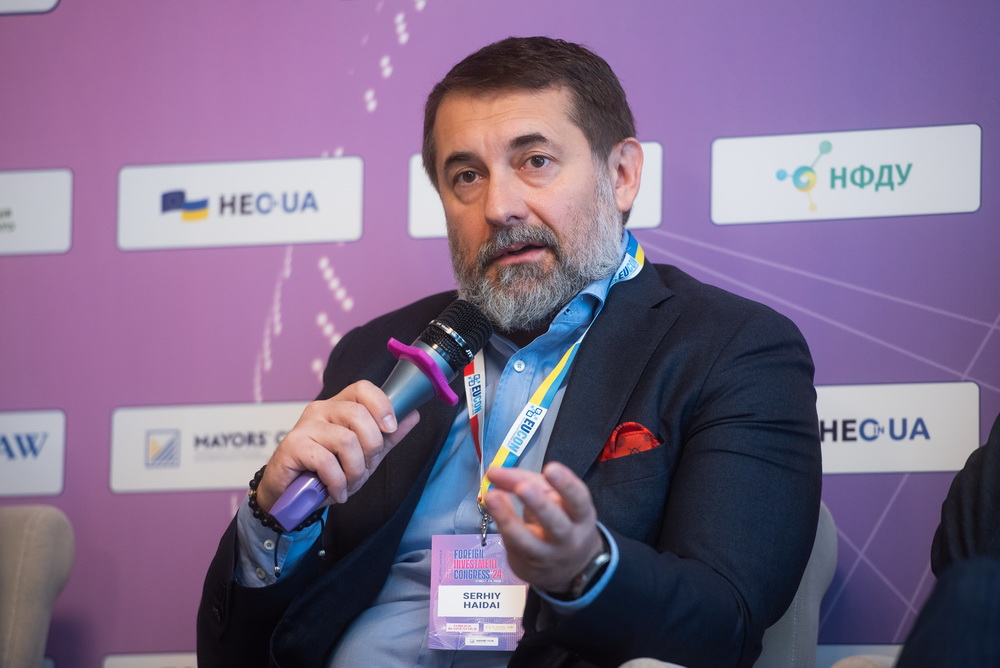
In his speech, Serhiy Haidai, Head of the Mukachevo District State Administration and the Mukachevo Regional Military Administration, shared his experience in public administration and raised important issues regarding the decentralisation of local authorities in Ukraine. He expressed his opinion that over time he has become not only an expert, but also a person with practical experience, in particular in the field of public service, having started his career as the head of the Mukachevo District State Administration in Zakarpattia.
Mr Haidai emphasised that decentralisation is an important step forward, but its implementation in Ukraine needs to be improved. He noted that economic capacity and voluntariness have become the main components of this process, but voluntariness has proved to be ineffective. According to him, the situation in Zakarpattia, where 62 communities were formed instead of the planned 40, illustrates this problem. He noted that the economic performance of many communities remains unsatisfactory, which indicates the need for a second wave of decentralisation, which involves the consolidation of communities.
The speaker also drew attention to the obsolescence of district councils and administrations, noting that they no longer fulfil their functional tasks and only drain budgetary resources. In his opinion, a new approach to governance is needed to meet modern challenges. He cited the example of military administrations that have demonstrated the effectiveness of making quick decisions in times of war.
“If we wait for the end of the war to start making changes, we will lose time and opportunities”, – concluded Mr Haidai.
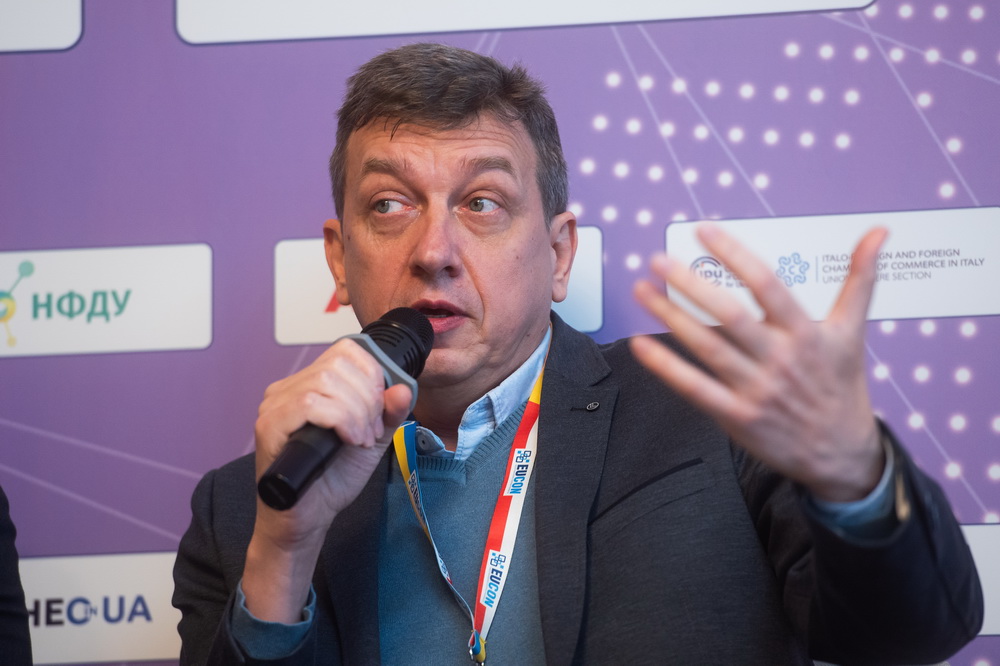
Oleksandr Donii, Ideologist, Chairman of the Centre for the Study of Political Values, also known for his political activism and participation during the Maidan revolution, focused on the need for strategic thinking in the face of the current challenges facing Ukraine.
Mr Oleksandr emphasised that in order to achieve victory, it is important for Ukraine to correctly assess the situation. He noted that while the government made optimistic predictions about the end of the war, he predicted that it would last for 15 years. Mr Donii emphasised that if the country is not prepared for long-term challenges, it risks falling into the trap of short-term thinking, which will lead to failure in plans and strategies. He noted that the ‘victory plan’ does not contain clear requirements for Ukraine itself, but only tries to shift the responsibility to international partners, so he called for active action by the Ukrainian government, emphasising the importance of domestic reforms and the development of the military-industrial complex.
Oleksandr Donii concluded his speech by calling on all the participants of the Congress to work together to create effective solutions that would help Ukraine win not only on the frontline, but also in life, contributing to the restoration of democracy and social stability in the country.
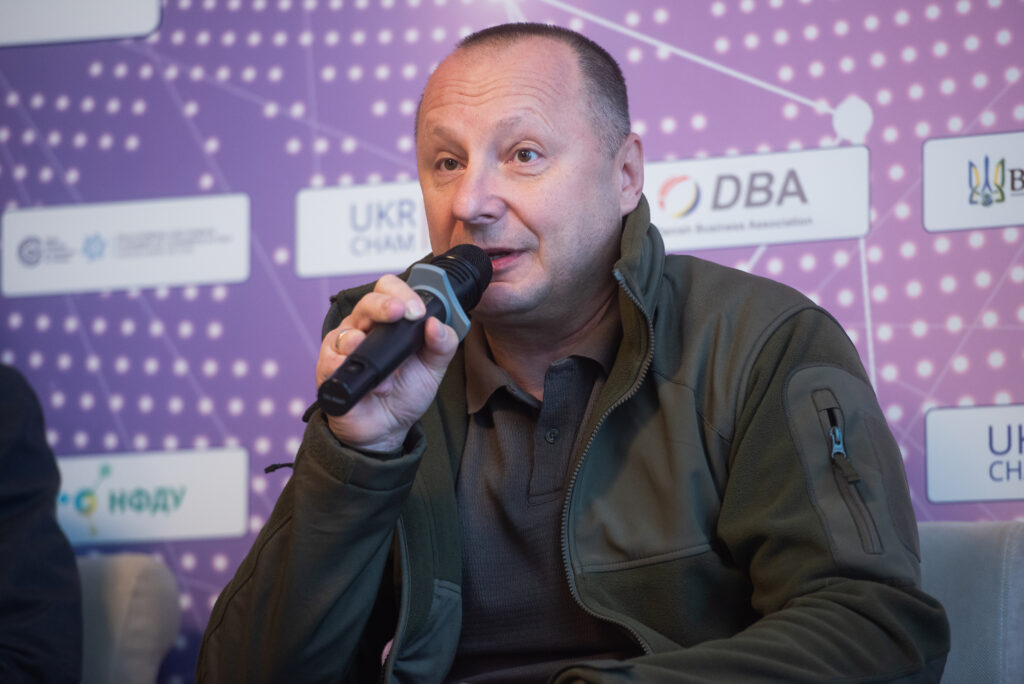
In his speech, Sergiy Pozniak, Chairman of the Association of ATO Veteran Entrepreneurs, informed that at least four million people with combat experience are expected to return after the war, and this will have a significant impact on the country’s business climate. He stressed the need to create effective solutions for the integration of veterans into society, noting that they have not become separated from it, but only need a comfortable return to civilian life. He said that the draft law on veteran entrepreneurship had recently been passed in the first reading, and this was the first step in the right direction.
He also drew attention to statistics showing that 13% of active military personnel are entrepreneurs, stressing that business and war are closely intertwined and that everything possible should be done to bring veterans back to business.
In conclusion, Mr Poznyak said that in order to successfully reintegrate veterans into the business community, it is necessary to scale up existing successful cases of veteran entrepreneurship and attract investment from international partners.
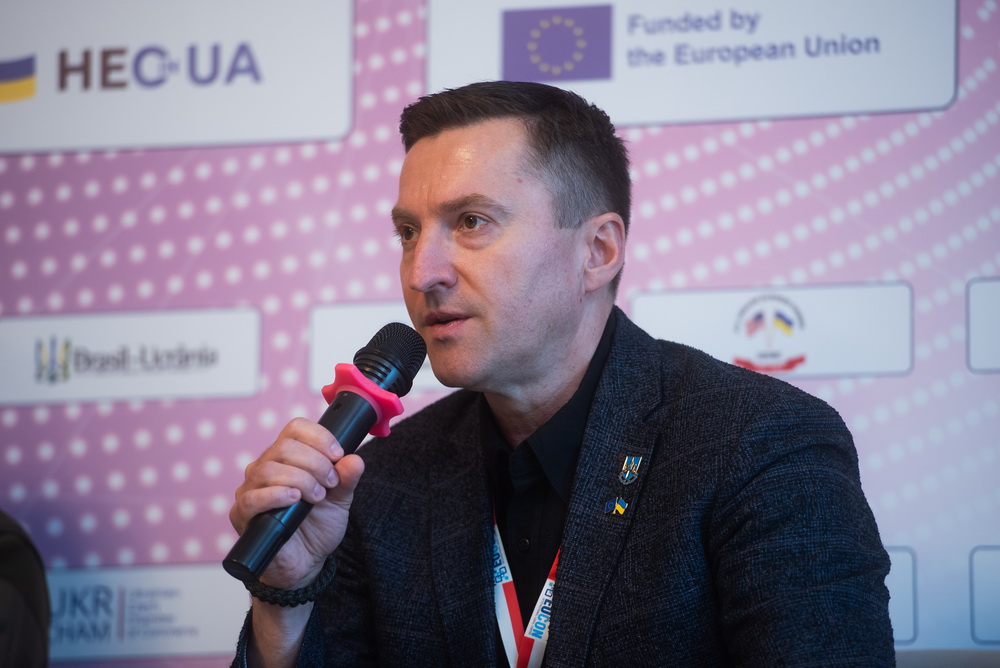
Oleksii Boniuk, Head of the Criminal Law Policies and Investments Protection Department, Office of the Prosecutor General of Ukraine, focused on the importance of preparing society to accept veterans, calling for developing new approaches to ensure their comfortable return. He emphasised that law enforcement reform is key to establishing a space of freedom, security and justice in Ukraine, which is critical for the country’s European integration course.
He spoke in detail about the comprehensive plan for reforming law enforcement and prosecution approved in 2023, including the detailed action plan launched this summer. Mr Boniuk assured that these reforms are not just theoretical discussions but are being actively implemented, and he expressed optimism that successful implementation will lead to a tangible sense of freedom, security and justice in the country.
“For the first time in 30 years, Ukraine is launching an in-depth crime survey – the Crime Survey. This study will form the basis for the development of new approaches to criminal policy. It will help us identify the key priorities that citizens are concerned about and develop relevant legislation based on them”, – the speaker said.
At the end of his speech, Oleksii Boniuk noted that the introduction of the electronic case management system is an important step towards digital transformation in Ukraine. This initiative will ensure full transparency, control and efficiency of law enforcement agencies, which will save up to 70-80% of resources.
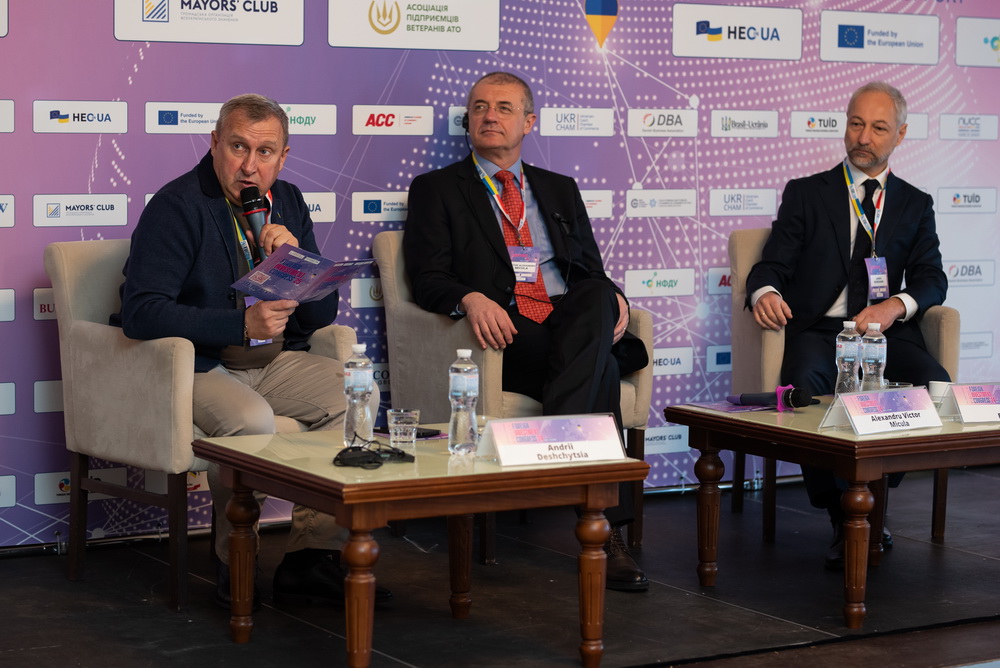
During the second panel discussion of the event, the participants discussed the role and mission of international diplomacy in attracting resources to restore Ukraine’s sustainable economic potential. The panel was moderated by Andrii Deshchytsia, Ukrainian Diplomat, Ambassador Extraordinary and Plenipotentiary of Ukraine to Poland (2014-2022), Acting Minister of Foreign Affairs of Ukraine (2014).
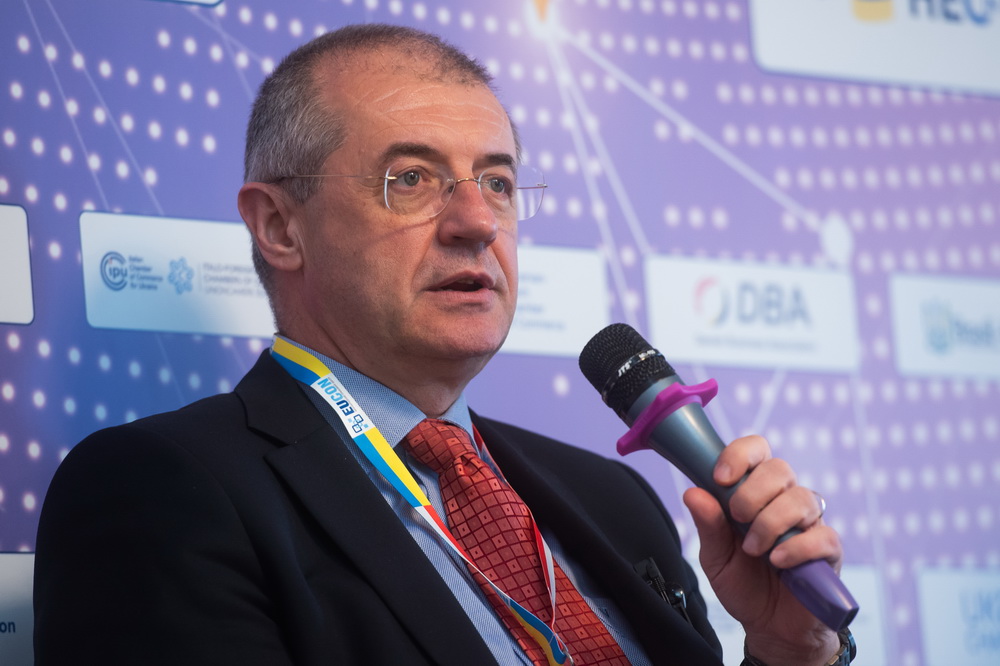
Alexandru Victor Micula, Ambassador Extraordinary and Plenipotentiary of Romania to Ukraine, shared his long experience of working with Ukraine, which spans more than 20 years in various positions. He expressed his admiration for the resilience and ability of the Ukrainian business sector to create new economic opportunities, even in times of war.
He noted that the Romanian government is actively cooperating with the Ukrainian government, including the Ukrainian Embassy in Bucharest, by organising regular conferences on recovery, where we exchange information and create platforms for cooperation between Ukrainian and Romanian entrepreneurs.
“Despite its limited resources, Romania is not a major donor, but its active support for Ukraine through the EU and national programmes contributes to the development of important infrastructure, including improved transport links between the two countries. The speaker highlighted a considerable expansion in the capacity of Romania’s borders, enabling transit volumes to grow from 2 million tonnes per month at the onset of the full-scale invasion to 5 million tonnes today”, – the Ambassador emphasised.
Mr Ambassador noted that Romania continues to invest in infrastructure projects, in particular in connecting roads and railways between Ukraine and Romania, as well as in the development of shipping on the Danube and the Black Sea, which is of strategic importance for the economic stability and development of both countries.
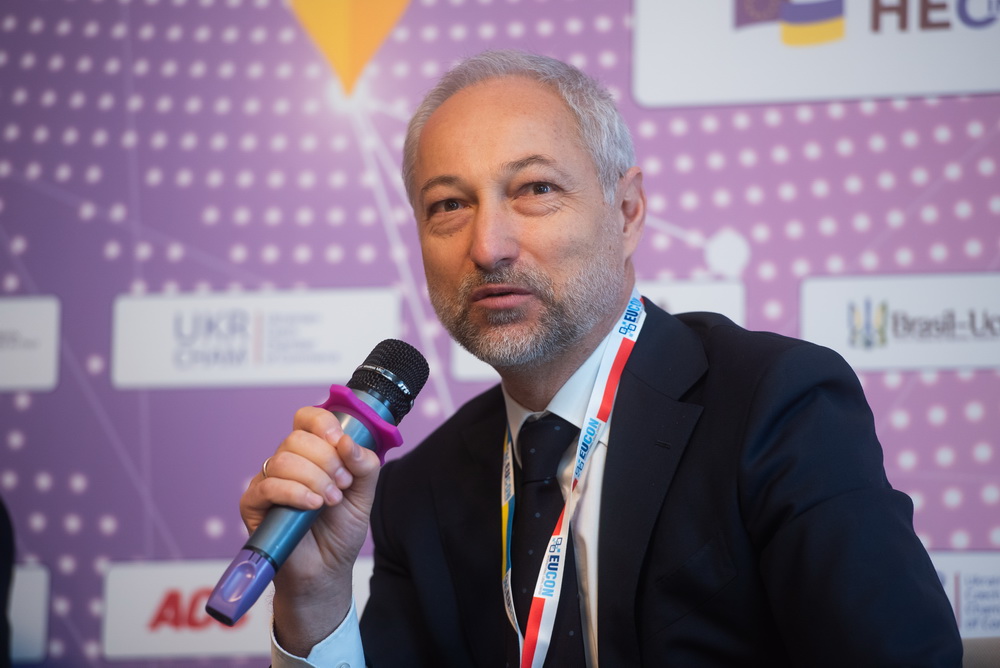
Jānis Bordāns, Latvian Politician, Deputy Prime Minister of Latvia (2019-2022), Minister of Justice of Latvia (2012-2014; 2019-2022), in his speech stressed the importance of cooperation between Latvia and Ukraine, including in the context of the investment climate.
He noted that Latvia provides Ukraine not only with military and material assistance, but also promotes commercial development.
The speaker emphasised the need for Latvian investors to actively participate in the development of Ukrainian business, noting that this is the right time for cooperation. At the same time, he stressed the importance of creating a favourable legislative environment in Ukraine, particularly in the context of fighting corruption, developing law enforcement agencies and providing tax benefits for foreign investors.
In conclusion, Jānis Bordāns emphasised that Ukraine has excellent technologies that can match the best Western innovations. He also underlined that the key factor for successful cooperation is for Ukraine to implement the best practices of countries such as Poland, the UK and Latvia, which will allow the country to accelerate its development and achieve economic prosperity.

Markiian Malskyi, Professor and Dean of the Faculty of International Relations at Lviv National University, Ambassador Extraordinary and Plenipotentiary of Ukraine to Poland (2010-2014), stressed the important role of universities in the process of rebuilding Ukraine. He noted that intellectual potential and science-based approaches are key elements of this complex process.
The speaker noted that international cooperation, which universities carry out through modern public diplomacy, is particularly important, allowing them to engage foreign partners in developing scientific concepts and shaping public opinion in other countries.
He also presented an initiative created jointly with foreign colleagues – the U7 consortium of universities, which includes educational institutions from the United States, Belgium, Italy, Poland and Ukraine. This consortium is conducting research on the risks that investors and Ukrainian society may face during the post-war reconstruction. The main goal of the initiative is to provide partners with clear, reliable and objective information about possible challenges to their business investments in post-war Ukraine.
Mr Malskyi added that it is important that universities, together with diplomatic and governmental structures, inform investors about the realities and risks of the post-war period, including corruption, organised crime, access to weapons, the functioning of state institutions, the adaptation of police officers with combat experience, migration issues and the role of oligarchs. “Investors should have a clear understanding of the possible challenges and be confident in controlling their investments”, – the speaker concluded.

Robin Barnett, British Diplomat, Ambassador of the United Kingdom to Poland (2011-2016) and Ireland (2016-2020), underlined the unwavering support of Ukraine by the United Kingdom, which remains one of the country’s leading financial donors. He noted that the British public has consistently demonstrated a high level of support for Ukraine, which is no coincidence. Barnett explained this phenomenon by the historical experience of the UK, which has always had a cautious attitude towards the Soviet Union and now the Russian Federation.
“Our experience shows that appeasement policies rarely lead to positive results, and we are facing a similar situation today”, – said Mr Barnett.
He emphasised the importance of the entrepreneurial spirit of Ukrainians, which he said will be key to moving the country forward after the war, and which is also playing an important role in the current events. Mr Barnett noted that, despite the difficult circumstances, the entrepreneurial spirit remains an integral part of Ukrainian society.
The speaker emphasised the need to address reputational issues, as it is crucial to create a positive image of the country in order to attract foreign investment. He noted that investors remain cautious and focused on long-term prospects, so it is worth attracting their attention to Ukraine now, even if major investment decisions are made later.
He added that although large investments are unlikely during the war, preparing for the investment period after the conflict is an important task, so work to inform and encourage investors should be done today to prepare a solid foundation for the country’s future economic development.
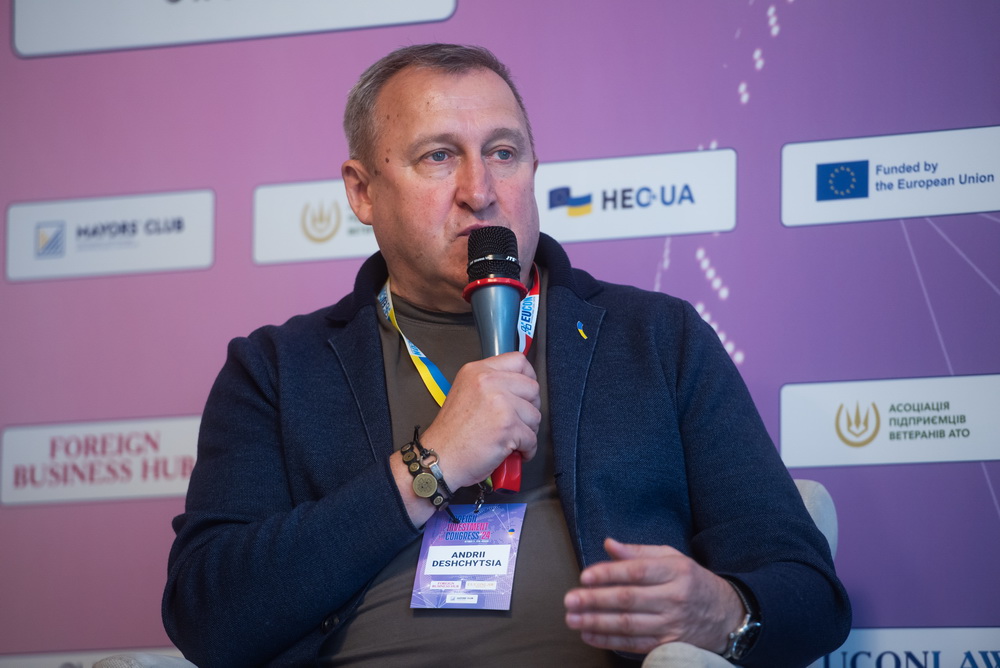
“I would like to thank all the panellists for their active participation in our panel. I am glad that we all agree that Ukraine has a huge potential that needs to be realised. I believe that various forms of cooperation, including this triangle, and possibly others, will become an integral part of the European and Euro-Atlantic space in the future”, – Mr Deshchytsia concluded the panel.
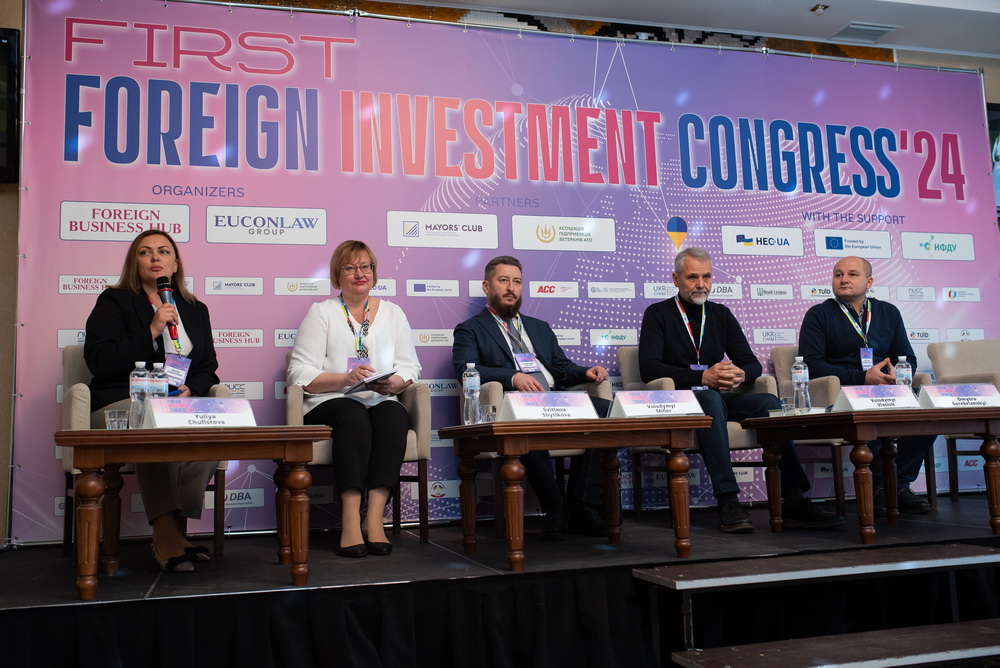
The third panel discussion was dedicated to the topic: ‘A level playing field, transparent rules and the rule of law as a key to attracting foreign capital and private investment in community, household development and education.’ The panel was moderated by Yuliya Chufistova, Presidium Member of the Mayor’s Club Ukraine, CEO of the Development Agency UMEDA.
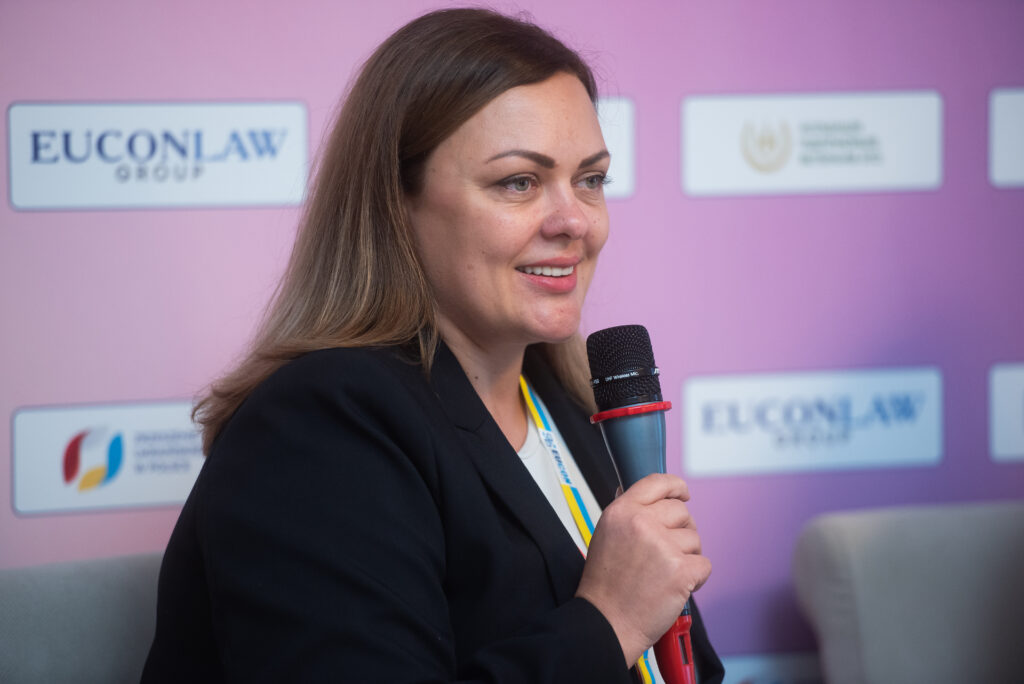
Opening the panel, Yuliya Chufistova emphasised that economic development of communities is impossible without the involvement of local businesses and international partners. She emphasised that it is important to distinguish between grant and investment funds, as investments involve a return with profit. In addition, the moderator drew attention to the need to develop the capacity of communities to serve potential investors, which requires knowledge, experience and expertise. For this purpose, it is important to organise training and exchange of practical cases that will contribute to successful investment attraction.
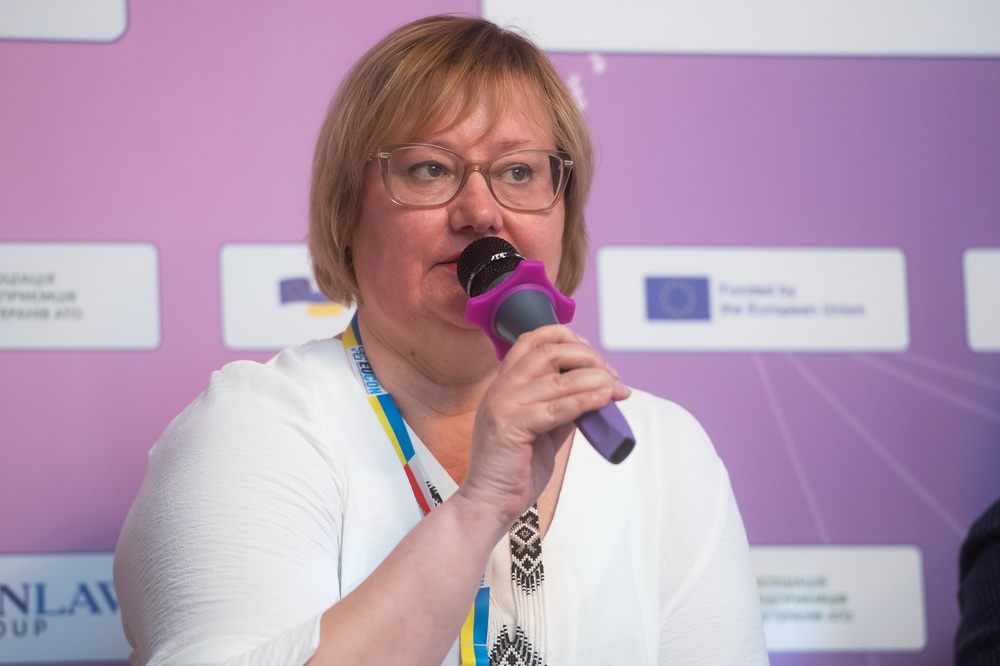
Svitlana Shytikova, PhD, Coordinator of the National Erasmus+ Office in Ukraine (EU-funded project) and Chairman of the Council of the ILIR, shared the experience of her team, which has 15 years of experience in the framework of the European Union programmes in Ukraine, in particular in the field of education. She emphasised the importance of the Erasmus+ programme, which since 2014 has opened up new opportunities for Ukrainian organisations, intensifying their participation in competitions and project implementation.
Svitlana informed that Erasmus+ programmes provide non-refundable investments to finance various projects in education, youth training and sports. These investments are implemented through initiatives that cover schools, vocational education institutions, higher education institutions, as well as organisations working in the field of adult education, youth and sports.
“The amount of funding varies from 35 thousand euros to 4 million euros, depending on the type of competition and the needs of the institutions. This allows not only to cover the costs of individual institutions, but also to create opportunities for cooperation with other stakeholders”, – said Ms Shytikova.
She also informed that 39 calls for proposals for Ukrainian organisations have been opened under the Erasmus+ programme. At the same time, the competitions have no restrictions on the involvement of various stakeholders, such as municipalities, libraries, universities, schools and other organisations. This opens up great opportunities for cooperation between educational, cultural and business institutions.
One of the problems Ms Shytikova pointed out was the lack of awareness of these opportunities at the local level. Therefore, in her opinion, it is important to intensify communication among all stakeholders to maximise the use of non-refundable investments in the development of critical sectors such as education, youth and sports.
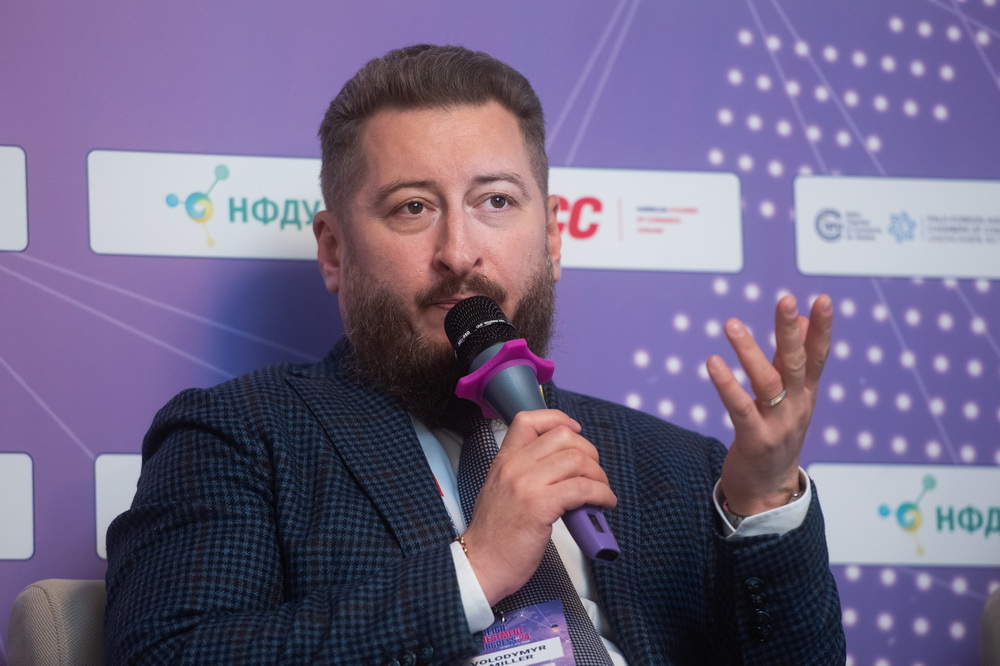
Volodymyr Miller, Deputy Mayor of Dnipro, Director of the Department of Economy, Finance and City Budget, Dnipro City Council, stressed in his speech that no real foreign investment should be expected in the central, eastern, southern and northern parts of the country until Ukraine wins the war. The speaker stressed the importance of understanding the reality that has become apparent after three years of war and the experience of cooperation with foreign partners from different parts of the world, ranging from Japan to Finland.
Volodymyr Miller also spoke about changes in approaches to the preparation of investment projects, noting that even the highest quality engineering and marketing solutions may not be acceptable to foreign investors due to their different approaches and requirements to engineering, environmental standards, and communication networks. “The project we are presenting today is primarily an idea and initial miscalculations, not a finished product”, – he said.
Mr Miller also stressed that the city has chosen a different strategy aimed at investing in itself, its community and city development. The goal is to make Dnipro attractive to residents, internally displaced persons (IDPs) and local businessmen who can become investors and industry development drivers. ‘It is important that these investments create a stable basis for development, support the economy and improve the quality of life for all our citizens,’ the speaker underlined.
He added that the sources of such investments may vary, but one of the main tools is financing through loans. Volodymyr Miller noted that since last year, lending processes have been actively resumed to develop infrastructure, transport, housing, and even educational projects. An important aspect of the strategy is also the development of an industrial park in the city centre, which has received state funding to connect to the energy grid.
“Developing our own resources and attracting domestic investors are key steps that allow the city to stay on the path to recovery and prosperity in the face of difficult geopolitical challenges”, – said Miller.
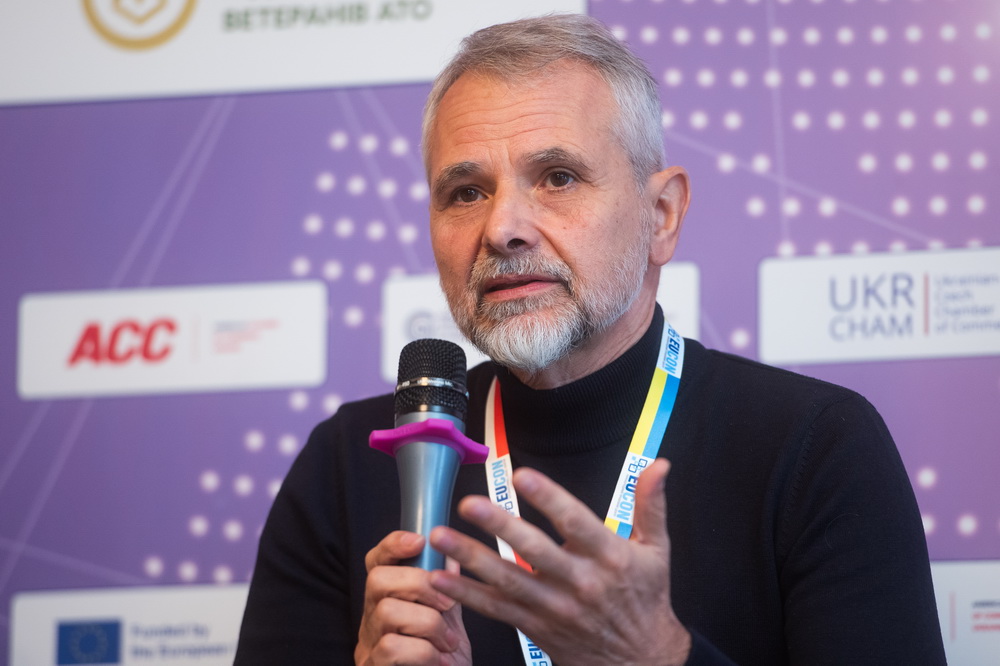
Volodymyr Vlasiuk, CEO of Ukrainian Industrial Expertise, Head of the Committee on Industrial Modernisation at the Ukrainian Chamber of Commerce and Industry, stressed the importance of a comprehensive approach to attracting capital investment in the face of current challenges.
He noted that domestic entrepreneurs should be an example for foreign investors. “When businessmen in the country start investing in new plants and successfully developing, the information about it quickly spreads around the world, and the country becomes attractive to other investors”, – the speaker said.
Volodymyr Vlasiuk also drew attention to the need for interaction between two key agents of the investment process – the state and entrepreneurs. “Investments are impossible without joint efforts of the state, which must create the right investment framework, and entrepreneurs who are willing to risk their money. The state should provide infrastructure support and reduce risks for business”, – said Mr Vlasiuk.
He also emphasised the importance of reducing the cost of capital investment and training qualified personnel. In conclusion, Volodymyr Vlasiuk summed up that an effective investment policy, including investment in infrastructure, will be the basis for attracting significant private investment and economic recovery after the war.
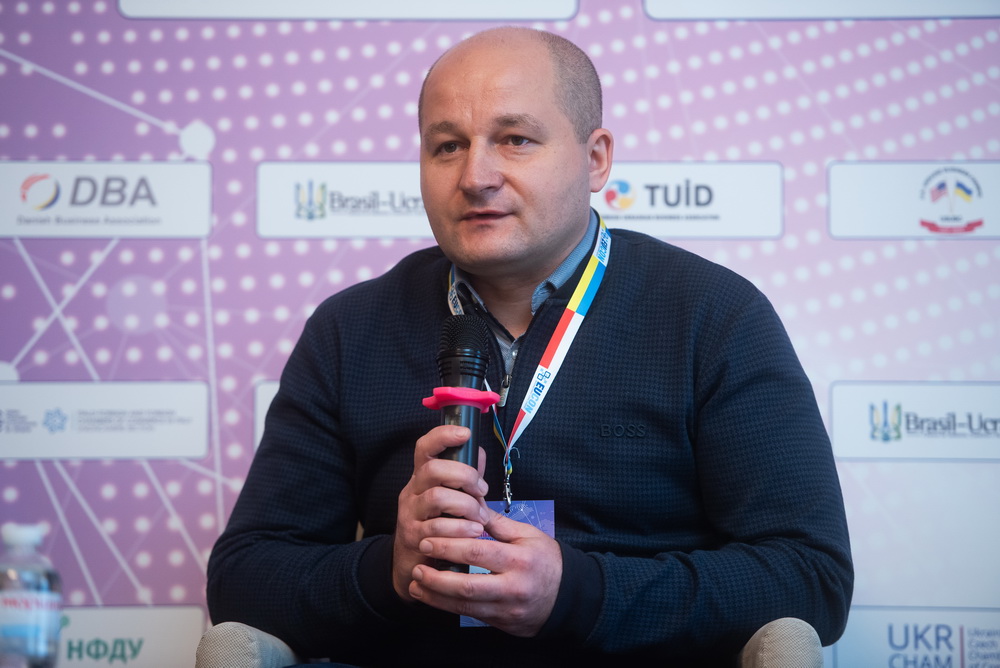
Dmytro Serebryansky, PhD, Acting Rector of the State Tax University in Kyiv, emphasised the importance of cooperation between universities, local communities and the government, especially in the context of post-war recovery. He noted that in the current situation, international partners are actively interested in the future development of Ukraine, and the synergy between universities, cities and Western partners can be a powerful tool for attracting investment.
Mr Serebryansky spoke about the current problems faced by Ukrainian universities, including the lagging behind of curricula from current global trends and even trends in Ukraine. He emphasised the importance of changing the approach to training specialists, orientating them towards modern labour market requirements and integrating successful entrepreneurs and international lecturers into the educational process, which will ensure the competitiveness of future graduates.
The speaker also shared plans for an important project to restore the university’s infrastructure, which is being implemented jointly with the city authorities. This is an architectural competition involving the United States, in particular, the American Society of Architects will assist in developing architectural solutions for the university’s restoration.
Dmytro Serebryansky concluded that effective cooperation between universities, local communities and the state is key to successfully attracting investment and implementing intellectually attractive projects that will help Ukraine not only recover but also increase its competitiveness in the international arena.
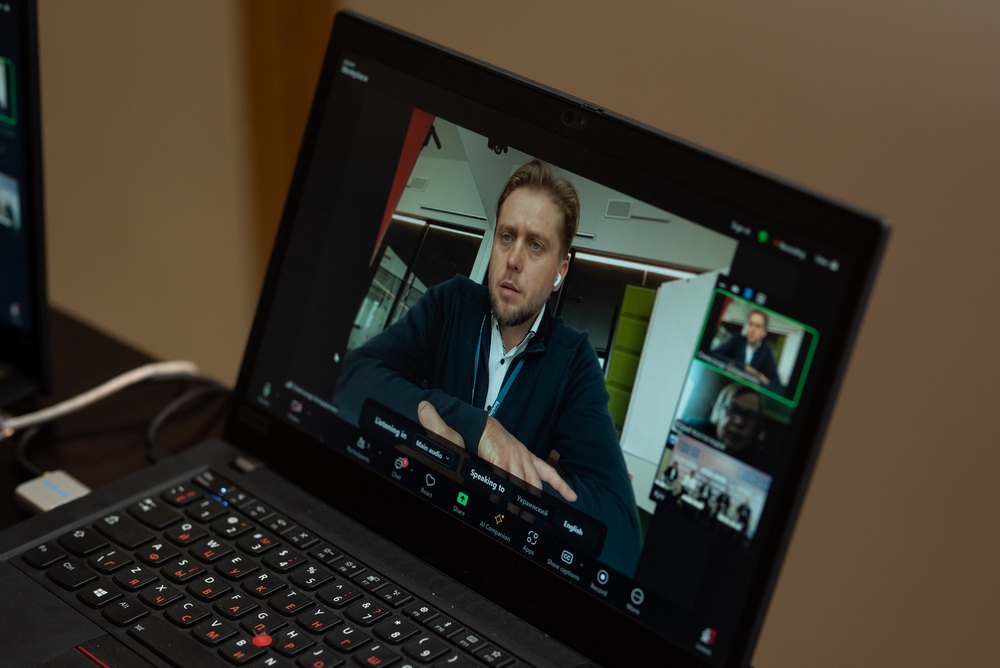
In his speech, Oleksandr Bondarenko, Managing Partner of NOVO Industrial Parks, drew attention to the problems faced by Ukrainian entrepreneurs in the current environment.
“We, as industrial parks, do not compete with each other in Ukraine for entrepreneurs. Unfortunately, we are competing with other countries, such as Poland, Romania and Lithuania, for where Ukrainian entrepreneurs will locate their production. And over the past year, we have seen that many Ukrainian companies have begun to actively build their plants in the European Union”, – said Bondarenko.
One of the main reasons for this, according to the speaker, is the “Made in EU” label, which simplifies access to European markets. In addition, he drew attention to the fact that Ukraine lacks proper investment incentives compared to the EU countries, which provide significant benefits for investors, including cashback of up to 60% on investments. “In Lithuania, for example, after an investment of EUR 10 million, you can get up to EUR 6 million in cashback after the plant is commissioned. In Ukraine, we lack economic incentives to attract investment, especially in times of war. This is not only a security issue, but also the availability of transparent mechanisms for administering taxes and stimulating business activity”, – the speaker noted.
Mr Bondarenko also spoke about the importance of creating favourable conditions for industrial development in Ukraine. He believes that only the construction of new factories can help restore the Ukrainian economy and increase its competitiveness in the international arena. In addition, he stressed the need to improve economic security, in particular in terms of protecting property rights and ensuring the stability of tax administration.
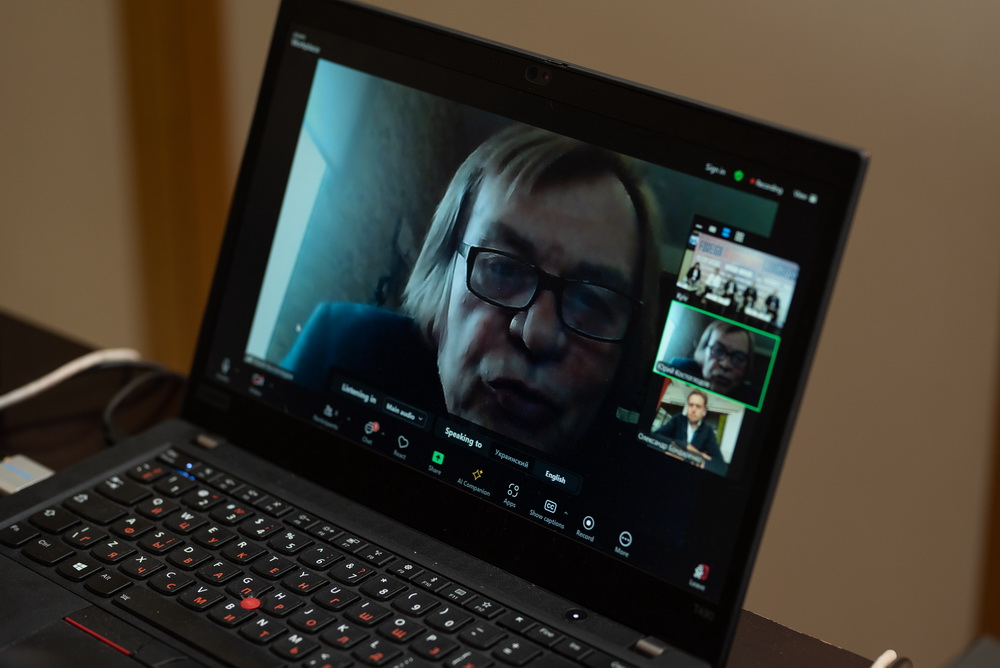
Yuriy Kostoglodov, PhD, Co-founder of the Eastern Ukrainian Business Forum, in his speech raised an important issue that Ukrainian companies face when attracting investments.
‘The fact is that business is not ready enough to work with investment funds. On average, it takes one and a half to two years for a company to reach an agreement with an investor,’ the speaker said. According to Yuriy, this process often becomes a significant barrier that negates all other advantages, such as investment attractiveness and the need to rebuild the country.
The speaker also drew attention to the differences between strategic and financial investors. While strategic investors make decisions based on their strategy and location, financial investors are looking for transparent financial statements and a clearly established company development strategy. “Investment is not a grant, a gift, a loan, it is a sale and purchase. For financial investors, it is a technological procedure that you need to be able to go through”, – said Mr Yuriy.
Concluding his speech, the speaker emphasised the importance of active work of business and communities to attract financial investments, which in turn will lead to an increase in tax revenues, creation of new jobs and overall economic growth.
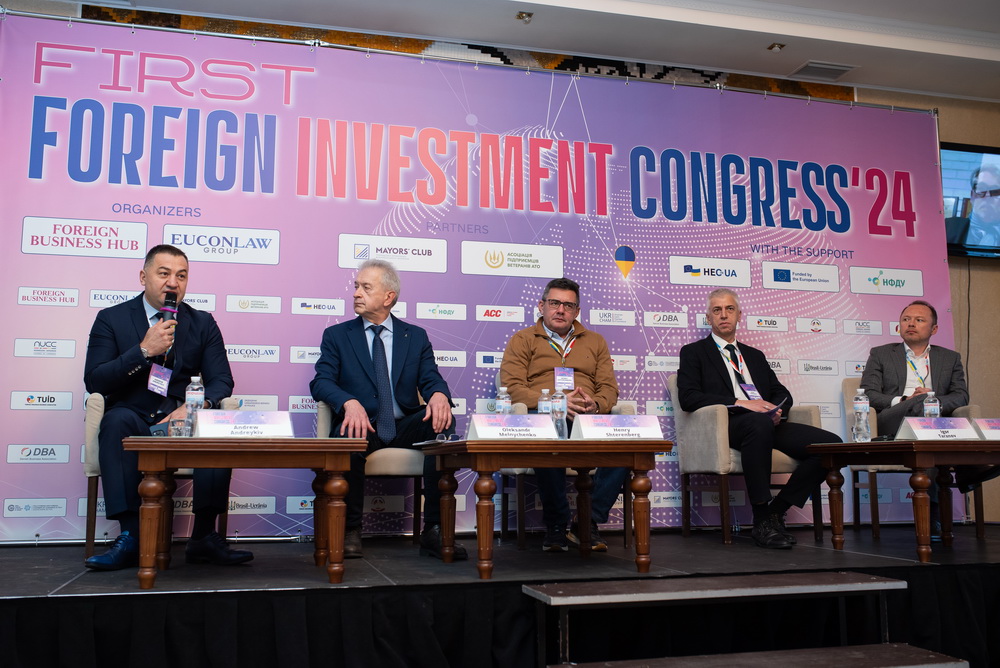
The fourth panel was devoted to access to international financial resources as an effective way to restore the competitiveness and internationalisation of small and medium-sized enterprises in Ukraine. The panel was moderated by Andrew Andreykiv, PhD, Advisor to the Chairman of the Lviv Regional State Administration.
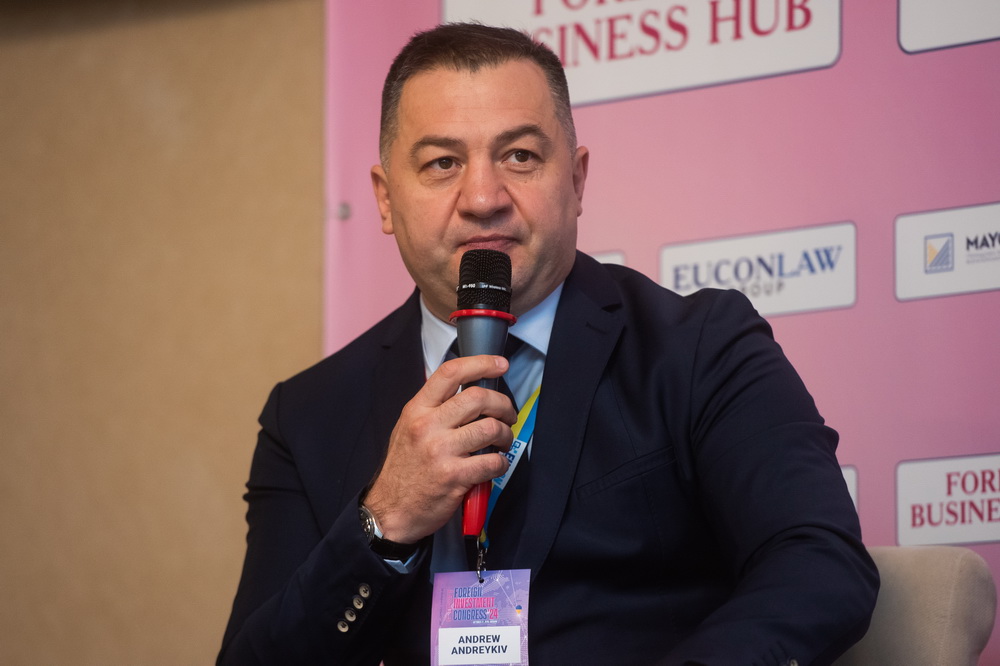
Opening the session, the moderator, Andrew Andreykiv, emphasised the importance of developing small and medium-sized businesses, which are the backbone of every society. ‘It is the middle class that creates stability and ensures the sustainable development of the state,’ said Mr Andreykiv.
He also shared Switzerland’s experience, which could be a useful example for Ukraine. “Recently, during a visit to this country, we were struck by the fact that in every small town and even in small villages there are factories where local residents produce high-precision products. This is an example of how effective engagement of communities in economic activities creates national added value and supports sustainable development through small and medium-sized enterprises”, – he said.
Mr Andreykiv added that this kind of comprehensive business engagement at the local level, which creates jobs and supports the local economy, should be the future benchmark for Ukraine’s development.
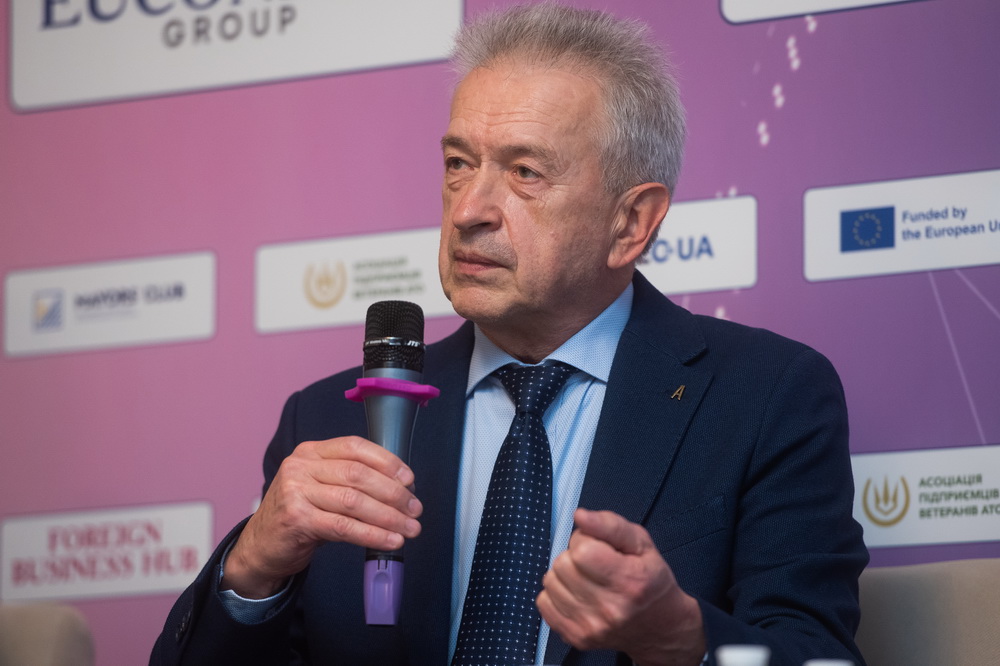
In his speech, Oleksandr Melnychenko, Acting Executive Director of UkraineInvest, stressed that investment in Ukraine during the war is not only an opportunity, but also a reality. ‘The government’s decision made on 4 October this year is particularly important, as it approved and supported large investors by signing a special investment agreement between the government and the investor. This day will go down in history as the beginning of a new stage in Ukraine’s investment policy, which provides powerful incentives for significant investments,’ said Mr Melnychenko.
Mr Melnychenko explained that thanks to the law on state support for investors with large investments (over EUR 12 million and creation of at least 10 jobs) adopted several years ago, which came into force in April this year, foreign and domestic investors now have access to a wide range of financial preferences. According to Oleksandr Melnychenko, foreign and domestic investors have access to financial preferences, including value added tax benefits, reimbursement of costs for engineering and transport infrastructure, land preferences and other tax and customs privileges.
Mr Melnychenko noted that the law covers various sectors of the economy, including industry, agriculture, healthcare, education, logistics, energy and mining. He also emphasised that UkraineInvest provides investors with ongoing support, including assistance in preparing documents to accompany applications through a transparent eight-step process, which is described in detail on the organisation’s website.
Oleksandr Melnychenko noted that despite the difficulties caused by the war, there are already positive results, and a significant number of investment projects are at various stages of implementation. He emphasised that Ukraine continues to improve its investment legislation, bringing it closer to European standards, but acknowledged that there is still a lot of work to be done.
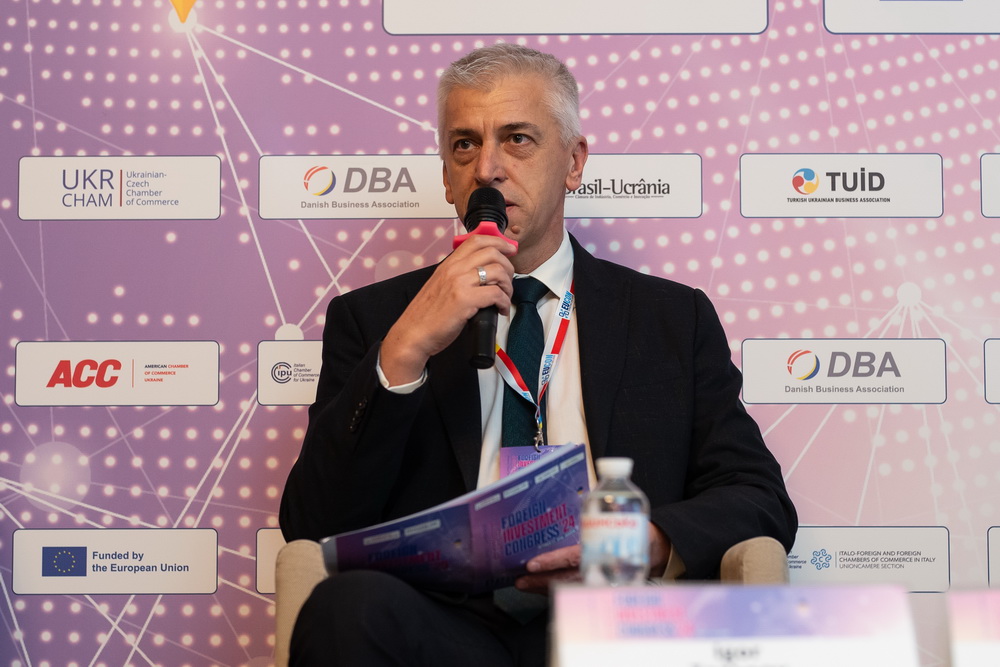
Igor Taranov, PhD, Associate Professor, Department Head of the Horizon Europe Office in Ukraine, National Research Foundation of Ukraine, said in his speech that the National Research Foundation is the only state institution that provides grant support to Ukrainian scientists and researchers on a competitive basis to solve urgent scientific problems. He emphasised that the Foundation has gained high trust from international partners, including the European Commission.
Mr Taranov also said that Ukraine has attracted funding under the Horizon Europe programme in the amount of EUR 54.17 million, of which 16% has been allocated for the development of small and medium-sized businesses. He stressed that Ukrainian enterprises should make more active use of this tool, as it provides significant opportunities for the development of innovative projects. However, he said, entrepreneurs often lack information and practical skills, which reduces their chances of success in competitions.
The speaker also spoke about special support programmes from the European Commission designed specifically for Ukraine in the time of war, such as ERA for Ukraine and MSA for Ukraine, Refugees. These programmes provide support to Ukrainian start-ups, including high-tech ones, which continue to operate both in Ukraine and abroad.
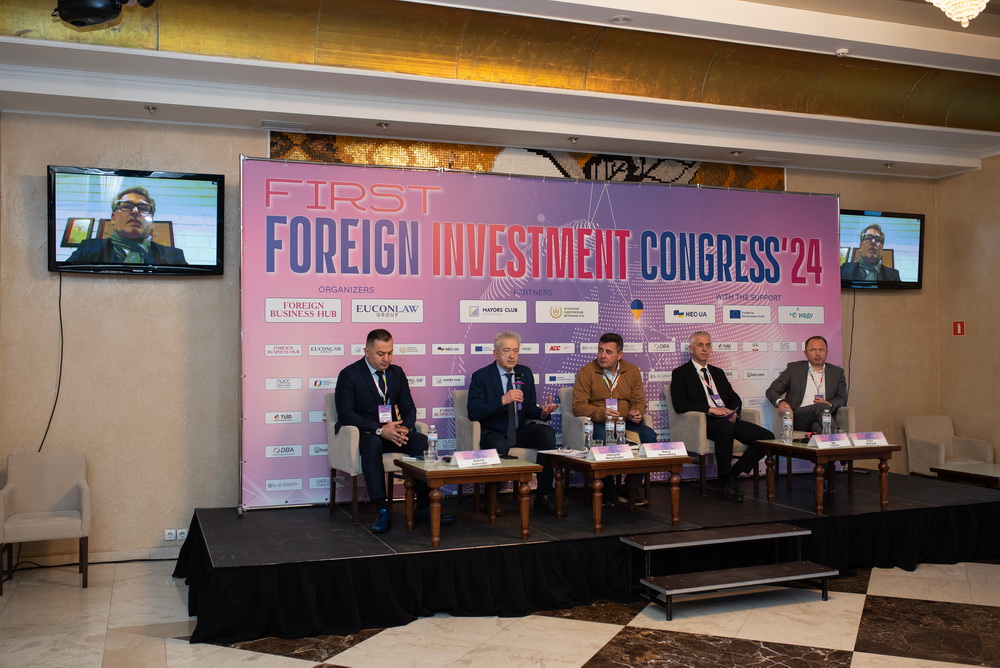
Dr Markus Ciupek, German Investor, Co-Owner and Executive at Time&Space Ukraine, Head of the Working Group on Manufacturing at the German-Ukrainian Chamber of Industry and Commerce, shared his experience of investing and doing business in Ukraine. Mr Markus said that he and his partners have been investing in Ukraine for the past eight years, starting their business from scratch, launching a company that manufactures wire harnesses for automotive safety systems such as airbags, steering wheels and seat belts.
Markus Ciupek emphasised that when he started his business in Ukraine, he faced numerous administrative difficulties: customs procedures, fire safety requirements, and labour laws. He noted that in an environment where the rules and approaches differed from those in Western Europe, successful work was only possible if he trusted local experts and had the support of effective business navigators.
Mr Ciupek noted that the problems of access to finance for small and medium-sized enterprises in Ukraine remain relevant. He emphasised the importance of proper training and information support for Ukrainian businesses to use the available resources to the fullest.
Comparing the experience of investing in Poland and the Czech Republic, Mr Ciupek noted significant improvements in the Ukrainian business culture, but stressed that the country still has room for development. He concluded his speech by calling for further improvements in the financial infrastructure and simplification of the environment for small and medium-sized businesses to support investors and ensure Ukraine’s economic growth.
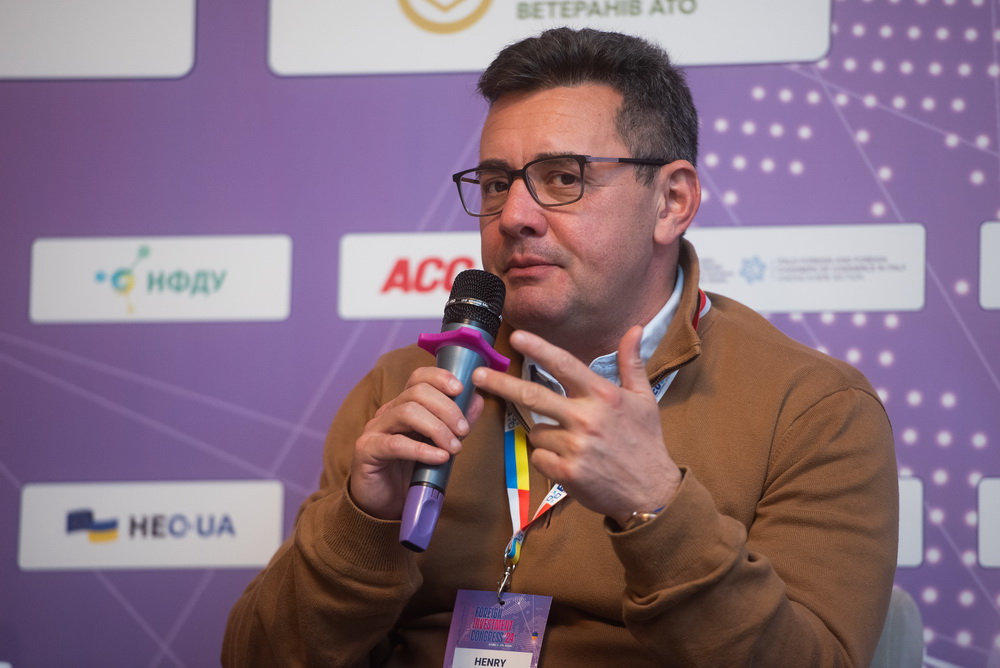
Henry Shterenberg, President of the World Trade Centre Kyiv, Founder of Economy of Trust Inc, in his speech stressed the importance of decentralisation as a way to economic development of Ukrainian municipalities, which opens up opportunities for local authorities to build their own economies.
He stressed that the country should create transparent, effective mechanisms for attracting investment at every stage. Mr Shterenberg also noted that Ukrainian municipalities lack the experience and resources to operate in a fully-fledged market environment. ‘We actively assist in the creation of commercial departments that prepare investment projects at the global level, providing tools for building the local economy and attracting investment,’ the speaker said.
Henry Shterenberg stressed that it is important for Ukraine, which is seeking EU integration, to adapt all sectors to European standards. He outlined three key groups of investors: ‘angel group’ – from 1 to 10 million investments, massive – from 10 million to a billion, and “black rocks” – billion-dollar infrastructure projects. Mr Sterenberg concluded that cooperation with international partners is important to provide management experience, financial stability and markets, which will create new jobs and promote economic growth.
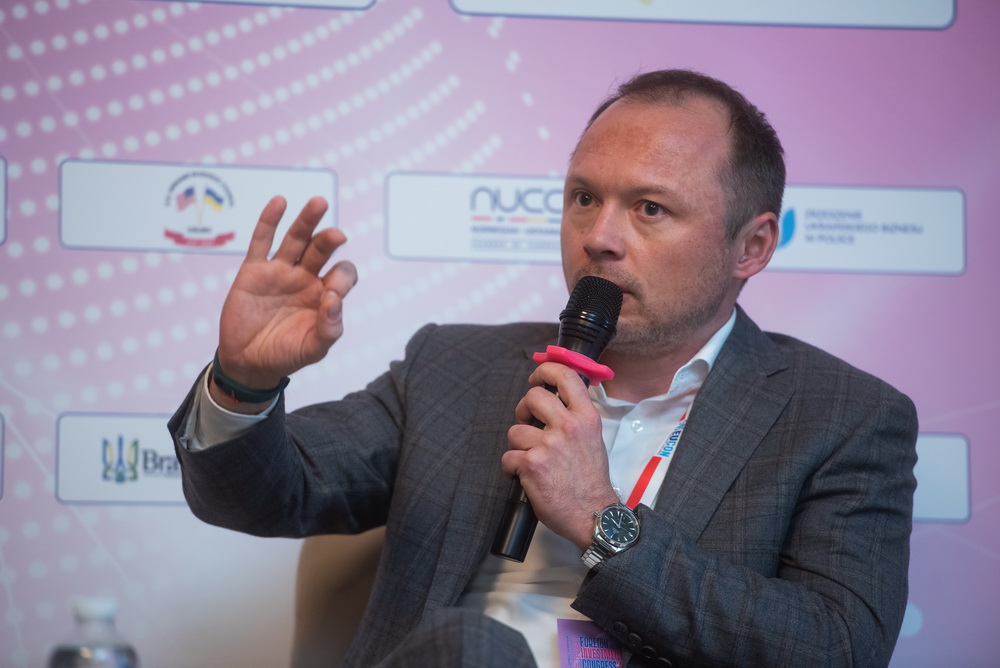
Pavlo Matiyash, Executive Director of the Ukrainian National Mortgage Association, CEO of Activitis Financial Company, emphasised that despite the martial law, their company managed to maintain a low level of non-performing loans (NPLs), which is about 10%. This was made possible by careful scoring and a balanced approach to lending: “We do not provide financing if we are not confident in the stability of the client’s business”, – said Mr Matiyash.
In addition, Pavlo Matiyash stressed that they actively help clients navigate grant programmes, providing advice on how to raise funds for long-term investments, and informed that they have established a Financial Education Centre to improve the competence of financial market professionals and promote social responsibility.
Pavlo Matiyash added that, according to the International Finance Corporation, small and medium-sized businesses are the key backbone of the economy, accounting for 50% of global GDP and creating 70% of jobs. He is convinced that small and medium-sized businesses are a true driver of economic development and can play an important role in rebuilding Ukraine. To do this, it is necessary to provide entrepreneurs with access to simple and convenient financial instruments, allowing them to focus on improving the quality, competitiveness and efficiency of their products.
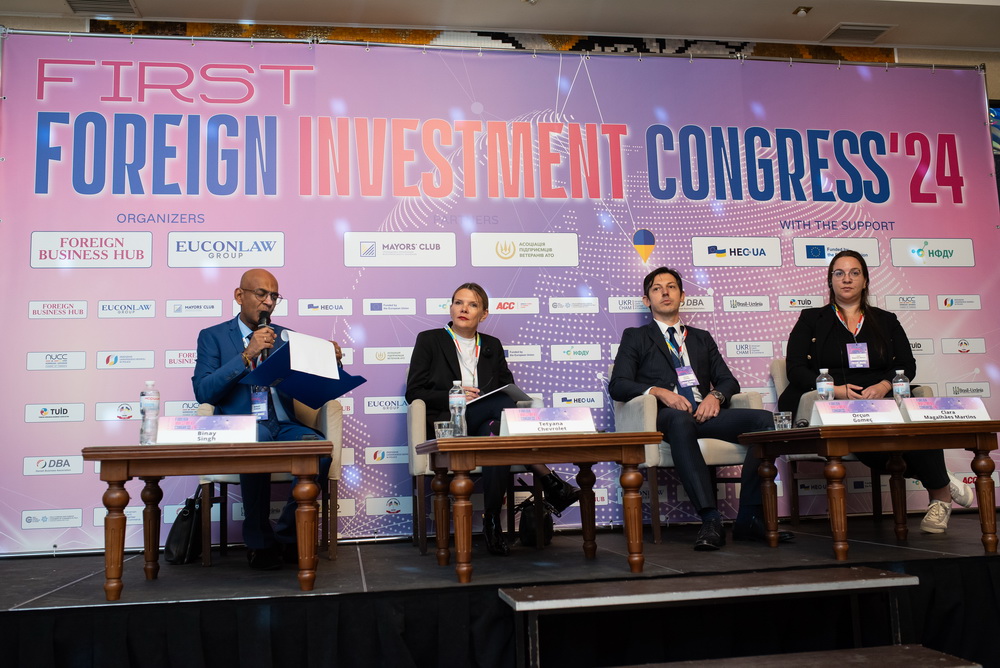
The final panel discussion of the event was dedicated to the role and mission of international business organisations in attracting private capital and effective lobbying for investors in Ukraine. The panel was moderated by Dr Binay Singh, Chairman of the Ukraine-India Business Association.
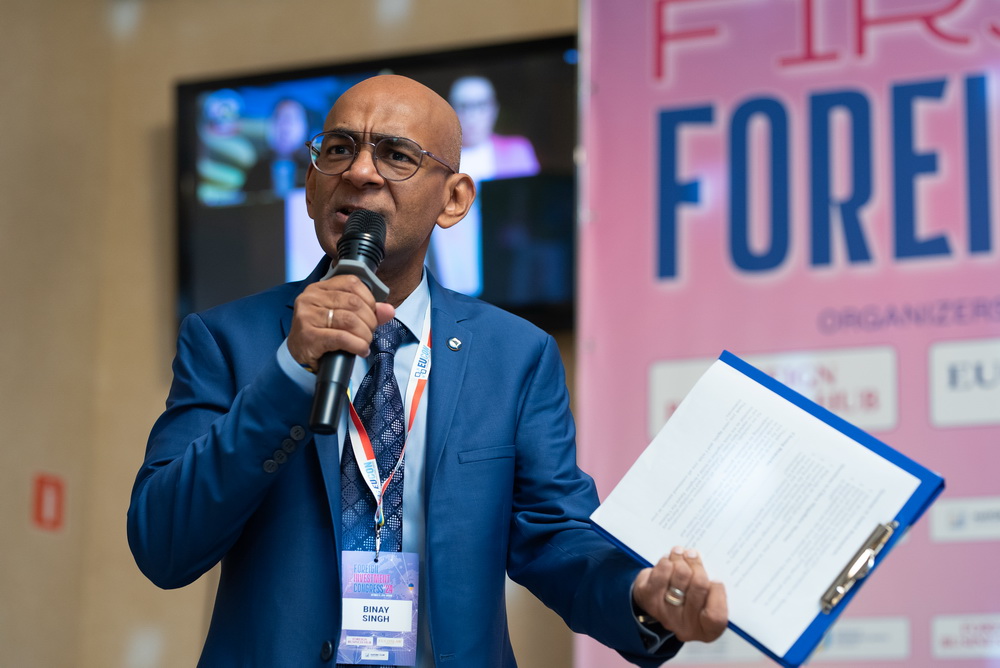
Opening the panel, Binay Singh welcomed all the participants and stressed the importance of the topic. ‘Today we have gathered to discuss an extremely important topic – the role of international business organisations in attracting investment and developing private initiatives,’ he said.
He emphasised that today’s discussion will focus on how international business organisations promote progress, support investors and address the challenges of attracting sustainable investment. ‘We will look at how these institutions help to build trust and stability, provide necessary expertise and pave the way for Ukraine’s economic revival,’ said Mr Singh.

Dr Irina Paliashvili, President of the U.S.-Ukraine Business Council, noted that the Council is the oldest and largest Ukraine-centric business council that is headquartered outside of Ukraine and celebrates its 30th anniversary next year.
She said that the Council is headquartered in the United States, in Washington, but the organisation is active in both the US and Ukraine. Irina emphasised that the team in Ukraine is extremely strong and active, and both countries have strong cooperation programmes. Currently, there are more than 230 members of the board, dominated by American companies that are actively doing business and investing in Ukraine, but also including Ukrainian companies and companies from other countries that share the vision and mission.
Irina Paliashvili also noted that the number of U.S.-Ukraine Business Council members who are eager to actively contribute to Ukraine’s recovery is growing.
She emphasised that rebuilding Ukraine is not a process that will take months or years – it has already begun. ‘There are urgent needs to rebuild the infrastructure and economy, so we encourage American companies to join this initiative now. As the country’s large-scale recovery will begin after Ukraine wins the war, it is important to start investing resources and efforts to prepare for this process today,’ said Ms Irina.
In conclusion, Ms Paliashvili emphasised that business ties between Ukraine and the United States have been established since Ukraine gained its independence, and American companies have become true veterans in the Ukrainian market. However, special attention should now be paid to the development of small and medium-sized businesses. She also noted that support programmes, including USAID programmes, are being actively implemented to this end.
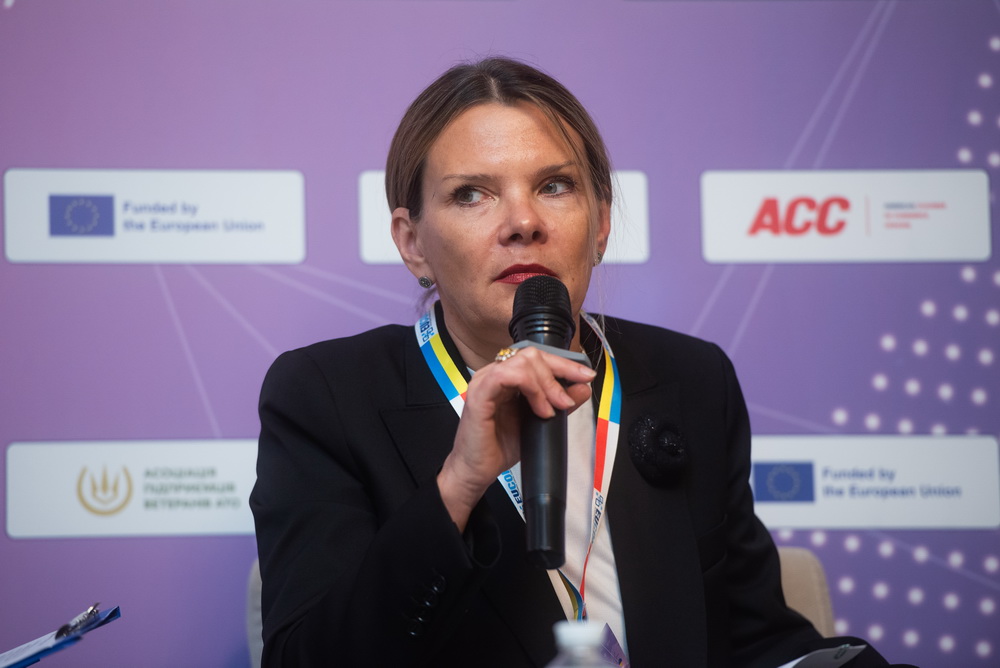
Tetiana Chevrolet, Vice President of the French-Ukrainian Chamber of Commerce and Industry, informed that the French-Ukrainian Chamber of Commerce and Industry is one of the largest international chambers of commerce in Ukraine.
She noted that the Chamber is part of 120 national French chambers of commerce and industry and unites more than 100 companies in Ukraine. ‘Despite the difficult conditions of the war, the Chamber continues its activities, supporting business ties between Ukraine and France. French companies remain the largest employers in Ukraine, employing over 30,000 people, particularly in the automotive industry, banking, agribusiness, and defence sector,’ said Ms Tetyana.
She also emphasised that France is the largest investor in the IT sector in Ukraine, and the Chamber is actively cooperating with government agencies, particularly in Paris, to develop bilateral economic ties.
‘I think we will see a lot of new IT companies, as well as technology and defence companies that will continue to come to Ukraine,’ concluded Ms Tetiana, stressing the readiness of French business to support Ukraine.

In her speech, Michaela Macharik, Czech Investor, Vice President of the Ukrainian-Czech Chamber of Commerce, said that she represents two organisations, one private and the other public: “The first is our company, which my husband and I founded eight years ago in Stryi. We specialise in the production of wire harnesses for automotive and household appliances. Before the war, the company employed 350 people, and 80% of our products were supplied to automotive concerns, including Volkswagen, Daimler, GLR, BMW, as well as well-known brands of household appliances: Zanussi, Electrolux, Whirlpool, Beko. However, the situation has changed dramatically since the outbreak of the war, and the automotive business has largely left Ukraine, and this is felt every day. Now 80% of our production is focused on household appliances and only 20% on the automotive sector. We had to cut our staff by half, but we remain one of the medium-sized employers in the region. The second organisation I represent is the Ukrainian-Czech Chamber of Commerce, which is located in the Czech Republic in Prague and has 160 members. In December, we are planning to open the Czech-Ukrainian Association in Ukraine, which is an important step in strengthening bilateral economic ties.”
The speaker emphasised that Ukrainians can only return home if there are decent jobs and the Ukrainian-Czech Chamber of Commerce is committed to attracting manufacturing companies to Ukraine that will create new jobs and support the economy.
Michaela Macharik noted that the Czech Republic was the first country to organise business missions to Ukraine. Thanks to the support of the Czech government, five business missions have been organised over the past two years, covering such cities as Lviv, Kyiv, Dnipro, Kryvyi Rih and Kharkiv. “The purpose of these missions is to unite Czech and Ukrainian businesses, promote investment and development of production in Ukraine”, – said Ms Macharik.
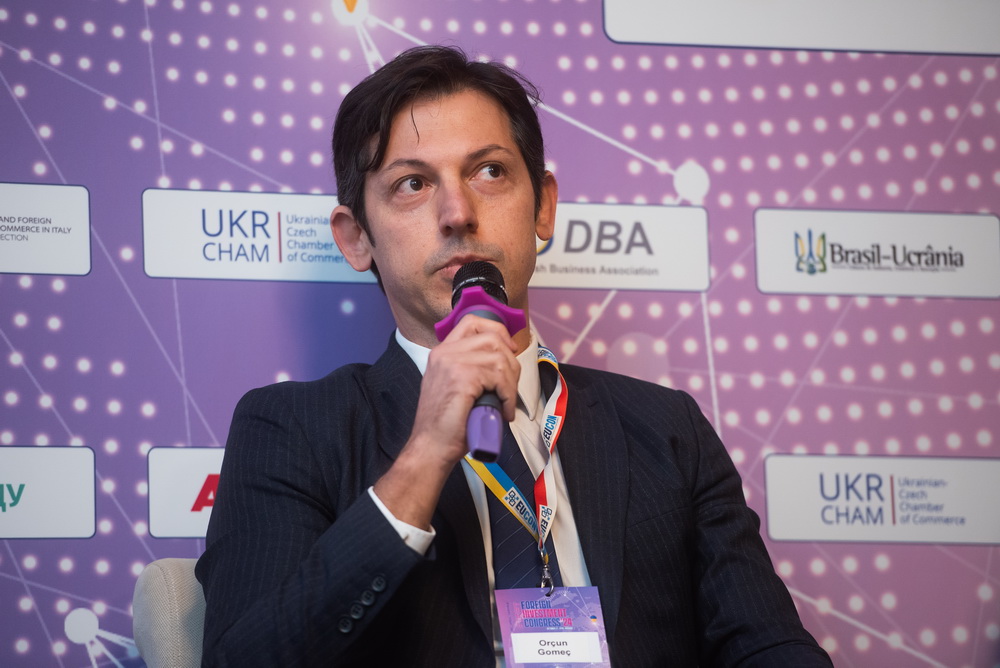
Orçun Gomeç, Managing Partner of EUROP Insurance Brokers, Member of the Board of the Turkish-Ukrainian Business Association (TUID), spoke about the significant contribution of Turkish investors to the development of the Ukrainian economy and outlined the prospects for improving economic cooperation between the two countries.
He noted that over the past five years, Turkish investments in Ukraine have totalled about $4.5 billion, and there are currently 800 Turkish companies operating in the Ukrainian market, which are represented not only in major cities but also throughout the country, providing leadership positions in various sectors, from construction to cosmetics.
‘Turkish construction companies have already implemented significant projects in Ukraine, including the construction of Boryspil International Airport, Darnytsia Bridge, highways and hotels, and Turkish companies generate about 8% of Ukraine’s total renewable energy, and even in times of war, investments in this sector continue,’ the speaker said.
Mr Gomeç informed that the Turkish-Ukrainian Business Association (TUID) celebrates its 20th anniversary this year, with 200 members covering 95% of Turkish investments in Ukraine. TUID brings together companies from various sectors of the economy and also welcomes foreign companies. “We aim at mutually beneficial cooperation and support for Ukraine’s economic development, as we believe it is of great importance for both countries”, – said Mr Gomeç. He also added that TUID actively promotes the exchange of experience among foreign investors, creating conditions for sustainable economic growth in Ukraine and expanding international cooperation.
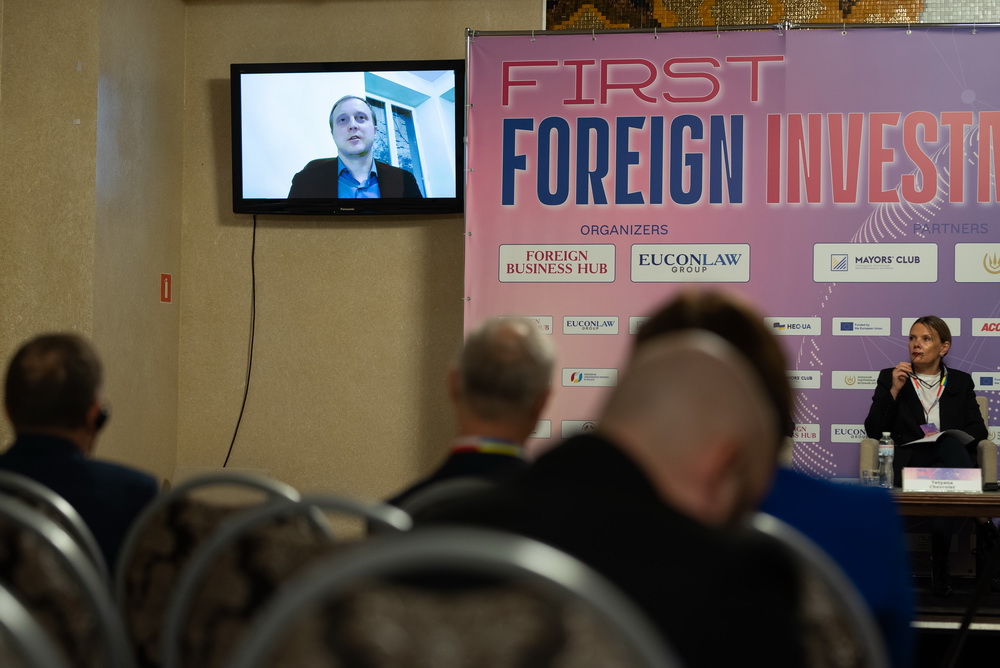
Andrii Romanchuk, Senior Partner at EUCONLAW Group, Member of the Board of the Association of Ukrainian Business in Poland, spoke about the activities of the Association, which was founded in 2015 with the support of the Embassy of Ukraine and other organisations. He outlined the main goals of the Association, including the exchange of experience between Ukrainian companies already operating in the Polish market, as well as support for Ukrainian enterprises in entering foreign markets.
“We share best practices in bringing Ukrainian companies to foreign markets, which is an important component of supporting the Ukrainian economy and developing exports of goods and services from Ukraine. This allows Ukrainian companies to save jobs and support their employees in Ukraine”, – said Mr Andrii.
Among the initiatives of the Association, Andrii Romanchuk mentioned the annual International Forum ‘Polish-Ukrainian Business Days’, which was launched to discuss important issues of doing business in Ukraine and Poland. In addition, he spoke about the Polish League of Ukrainian Students, a platform that brings together Ukrainian students studying at various universities in Poland. According to Andrii Romanchuk, experienced entrepreneurs can share their knowledge and ideas with the younger generation, thus contributing to the development and support of the next generation of businessmen.
He also mentioned the challenges faced by Ukrainians in the Polish market, including legal issues, opening bank accounts, access to financial instruments, as well as cultural differences and management issues.
“We strive to support those who are just starting their business in a new country so that they can successfully adapt and overcome the difficulties they face in the process of integration in a new market”, – summed up Andrii Romanchuk.
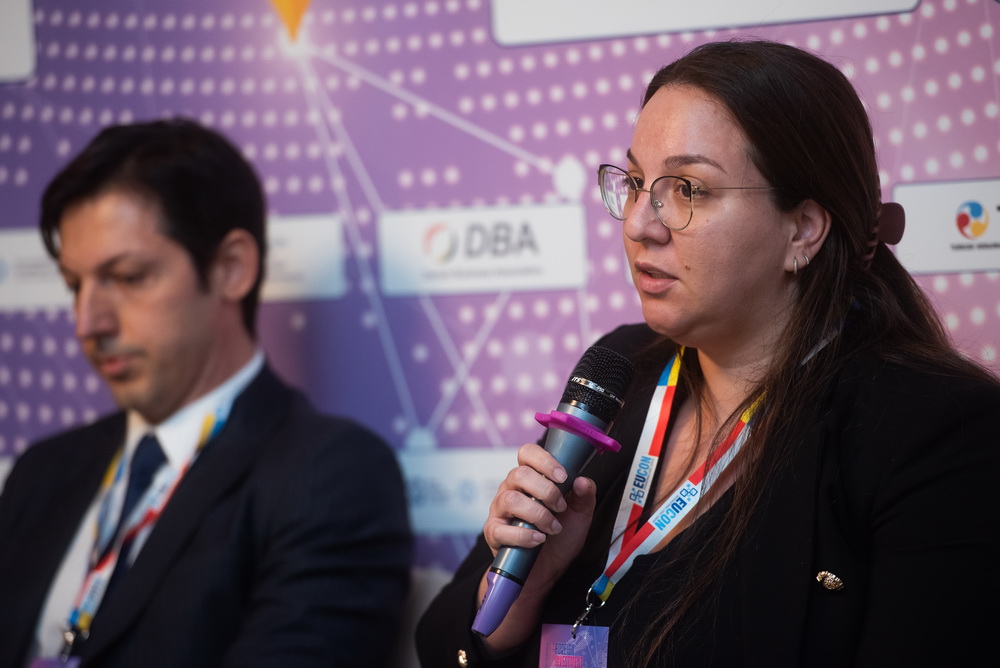
Clara Magalhães Martins, Representative of the Brazil-Ukraine Chamber of Commerce, noted in her speech that their association is a new project, but she already sees a huge potential for cooperation between Brazil and Ukraine. Ms Carla stressed that although the numbers are not impressive at the moment, both countries have great synergies in many areas, such as agriculture, technology, and common interests in bioenergy and biofuels.
‘Ukraine, like Brazil, is actively developing in technology sectors, such as fintech and the latest technologies for agriculture. One of the main goals of our Chamber is to increase the number of partners between Latin America and Eastern Europe, as well as to promote business from Brazil to Ukraine and from Ukraine to Brazil,’ said Clara Magalhães Martins.
She also noted that the Brazilian side is interested in establishing joint ventures in the fields of bioenergy and biofuels, where Ukraine has the potential to become a leader in Europe.
Clara Magalhães Martins also shared her advice on how Ukrainian companies can enter the Brazilian market. She noted that the first step for companies should be a thorough market research and assessment of the product’s viability in Brazil. One of the most effective options is to cooperate with Brazilian associations and local organisations to assess the opportunities and specifics of the market.
We would like to thank all the partners and speakers who supported our event, joined the discussion and shared their valuable ideas and experience. We look forward to seeing you again at our future events.
The Second Foreign Investment Congress is scheduled for May 2025 and we are pleased to invite everyone to participate!
ORGANISERS


PARTNERS
WITH THE SUPPORT OF
INFORMATION PARTNERS




